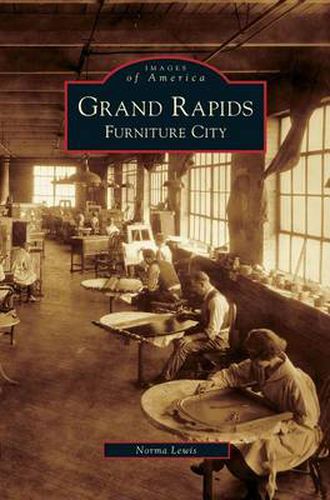Readings Newsletter
Become a Readings Member to make your shopping experience even easier.
Sign in or sign up for free!
You’re not far away from qualifying for FREE standard shipping within Australia
You’ve qualified for FREE standard shipping within Australia
The cart is loading…






This title is printed to order. This book may have been self-published. If so, we cannot guarantee the quality of the content. In the main most books will have gone through the editing process however some may not. We therefore suggest that you be aware of this before ordering this book. If in doubt check either the author or publisher’s details as we are unable to accept any returns unless they are faulty. Please contact us if you have any questions.
William Haldane opened a cabinet shop in 1836, 14 years before Grand Rapids incorporated. Other furniture companies followed: Berkey and Gay, Widdicomb, Sligh, Hekman, and Phoenix were among those taking advantage of the Grand River for transportation and power, the area’s abundant hardwood supply, and a growing immigrant labor pool. The furniture soon attracted national attention. In 1876, the Philadelphia Centennial Exposition proved conclusively that a river town in Michigan had indeed earned the title Furniture City. Presidents Herbert Hoover, Franklin D. Roosevelt, Harry S. Truman, and Dwight D. Eisenhower all worked at Grand Rapids-made desks. Fifteen manufacturers joined forces to build 1,000 Handley Page bombers during
World War I. The Japanese Instrument of Surrender was signed on September 2, 1945, at a table made in Grand Rapids. Despite fires, floods, strikes, depressions, and wars, Grand Rapids led the industry until the 1950s and 1960s, when the factories began moving to North Carolina. Today the area, along with nearby Holland and Zeeland, dominates the office furniture industry.
$9.00 standard shipping within Australia
FREE standard shipping within Australia for orders over $100.00
Express & International shipping calculated at checkout
This title is printed to order. This book may have been self-published. If so, we cannot guarantee the quality of the content. In the main most books will have gone through the editing process however some may not. We therefore suggest that you be aware of this before ordering this book. If in doubt check either the author or publisher’s details as we are unable to accept any returns unless they are faulty. Please contact us if you have any questions.
William Haldane opened a cabinet shop in 1836, 14 years before Grand Rapids incorporated. Other furniture companies followed: Berkey and Gay, Widdicomb, Sligh, Hekman, and Phoenix were among those taking advantage of the Grand River for transportation and power, the area’s abundant hardwood supply, and a growing immigrant labor pool. The furniture soon attracted national attention. In 1876, the Philadelphia Centennial Exposition proved conclusively that a river town in Michigan had indeed earned the title Furniture City. Presidents Herbert Hoover, Franklin D. Roosevelt, Harry S. Truman, and Dwight D. Eisenhower all worked at Grand Rapids-made desks. Fifteen manufacturers joined forces to build 1,000 Handley Page bombers during
World War I. The Japanese Instrument of Surrender was signed on September 2, 1945, at a table made in Grand Rapids. Despite fires, floods, strikes, depressions, and wars, Grand Rapids led the industry until the 1950s and 1960s, when the factories began moving to North Carolina. Today the area, along with nearby Holland and Zeeland, dominates the office furniture industry.